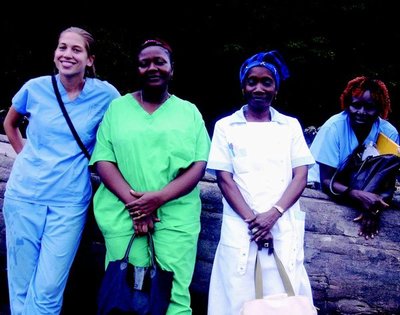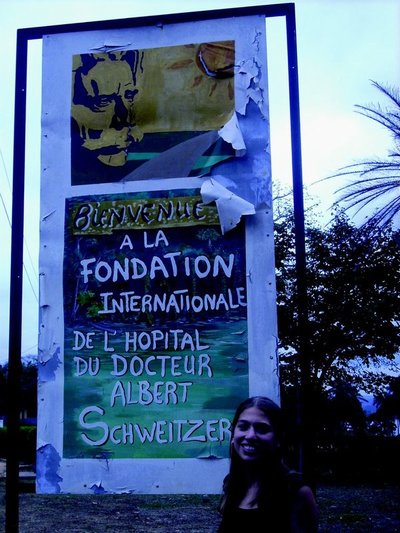October 14, 2010
Providing care to the villages of Gabon
Third-year pharmacy student Elise Fields entered the School of Pharmacy in hopes of pursuing a career in public health and global pharmacy. She has wasted no time in getting hands-on experience in both areas.
She previously volunteered as a medication screener for a regional medicine-return program. In 2009, she received a School scholarship to spend her summer in Ghana, where she worked with Ghanaian pharmacy students and faculty on a drug-safety campaign.
This year, she was selected as one of six Lambarene Albert Schweitzer Public Health Fellows.
Through the Schweitzer fellowship, Fields went to the west central African nation of Gabon this summer to work at the famed Schweitzer Hospital in the jungle village of Lambarene. She is the first pharmacy student in the 30-plus-year history of this program to receive this fellowship.
The Lambarene hospital was founded in 1913 by Albert Schweitzer, the 20th century musician, philosopher and physician who later became a Nobel Peace Prize Laureate. The hospital is devoted to studying the major causes of infectious diseases in sub-Saharan Africa and serving a population with extremely limited access to care. Even today, many Gabonese people travel for days to reach the clinic.
Schweitzer Fellows get experience serving a population with major health issues — including HIV/AIDS, malaria and tuberculosis. Meanwhile, the experience is intended to help them become leaders who are dedicated and skilled in addressing the health needs of underserved communities.
One of Fields’ roles at the hospital was to focus on a multi-department project to improve drug-delivery practices. In addition, Fields tailored an existing diabetic-regimen handout to make it more accessible to a poor and mostly illiterate population. She also developed and executed a study on patient attitudes toward side effects caused by drugs from both traditional and modern medicine.
This summer turned out to be especially busy for the already-hectic hospital. Health care workers throughout the nation were in the midst of a long strike when Fields arrived in Lambarene. The Schweitzer Hospital was one of the few open health care facilities in the nation.
“It wasn’t unusual for patients to spend all day waiting to see a physician,” Fields said.
A few times a week, she also traveled to remote villages with nurses from the maternal/child health program. They provided health clinics to people with no other access to care. She worked alongside the prescribing nurse or junior physician by helping to determine the most appropriate medications from the limited selection as well as counseling the patients.
“I often felt awed by the severity of cases we saw,” she said. “Parents would present children with highly acute problems to us because of the distance and expense to take them to a clinic. We could only transport the most extreme cases back to the hospital, assuming we had room. We had to treat many complex cases based strictly on empirical evidence. We often didn’t find out the outcomes.”
Fields said she was grateful to be able to help in whatever way she could. Further, she is thrilled to have been chosen as the first-ever pharmacy student to be a Schweitzer Fellow. She enjoyed showing the other fellows in Gabon how important it was to have a pharmacist on their health care team — despite any initial surprise they had when they met her. She hopes to continue playing a part in moving the field of pharmacy forward.
“I hope that my experiences in Lambarene will inspire other future pharmacists to promote our profession beyond preconceptions and find new ways to serve patients,” she said.


